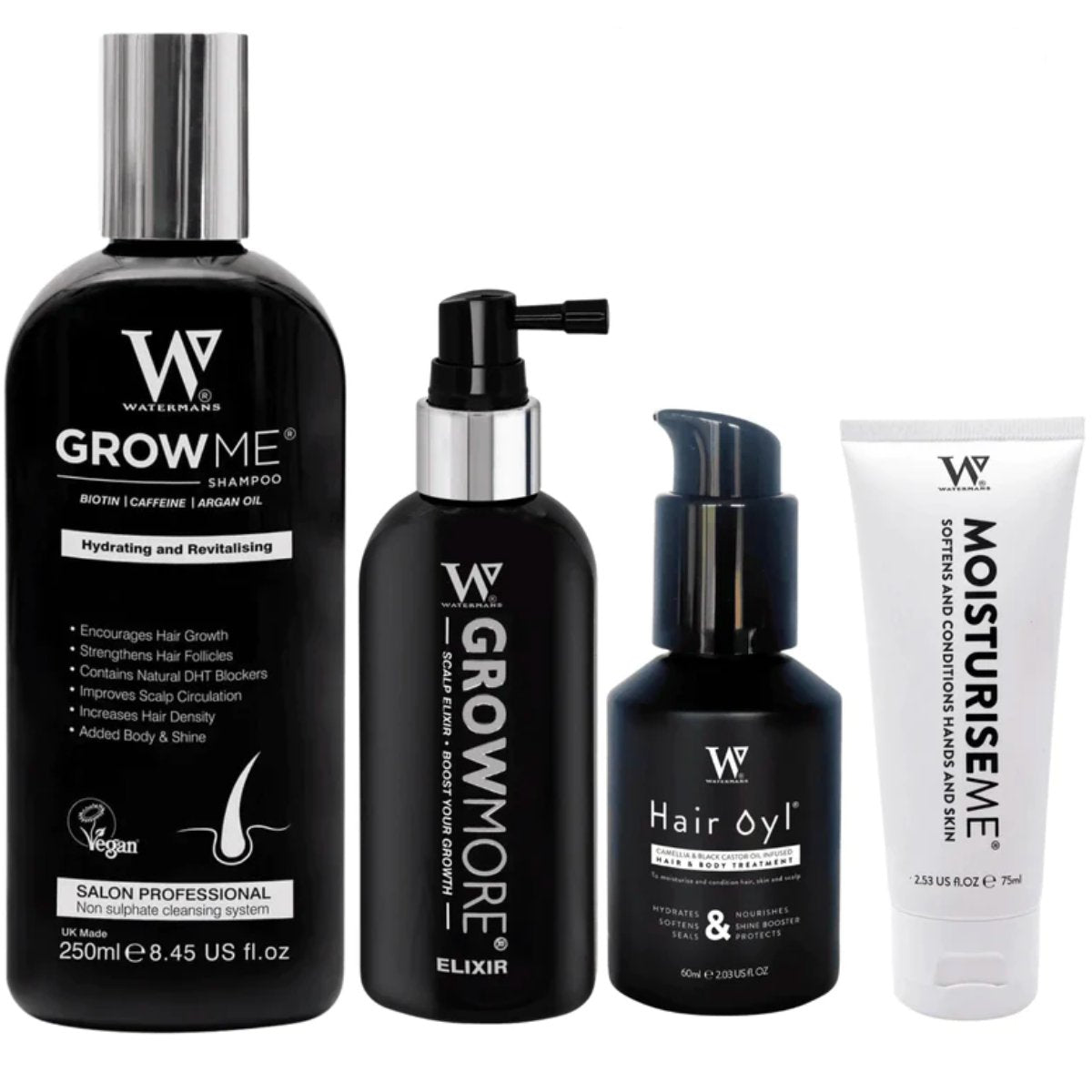
Unlock the Secrets to Hair Restoration: Your Essential Guide to Hair Loss Consultations
Hair loss is something that affects many people and can be quite distressing. Understanding what’s happening is the first step to finding solutions. If you’ve noticed a receding hairline, excessive shedding, or changes due to stress or hormones, seeking a hair loss consultation is a smart move. In this article, we will explore what you can expect during a consultation, how to prepare for it, and the potential treatment options available to help you restore your hair. Not only is it crucial to understand the reasons behind hair loss, but it’s also essential to find effective solutions. With the right guidance, you can take steps towards healthier hair, which is where products like Watermans Grow Me Shampoo come in – a natural and effective solution for promoting hair growth and preventing hair loss.
Key Takeaways
- Hair loss consultations are crucial for determining the underlying cause and effective treatment options.
- Patients should prepare detailed personal and medical history to facilitate accurate diagnosis during their consultation.
- Effective hair restoration may include medications, lifestyle modifications, or procedures like hair transplants, depending on individual needs.
Preparing for Your Hair Loss Consultation
Preparing for Your Hair Loss Consultation
When it comes to addressing hair loss, having a consultation is a key first step. It's like getting a roadmap for your hair journey—understanding what's happening and how to tackle it! This article will guide you through everything you need to expect during your consultation, how to prepare, and some treatment options available to you. If you’ve noticed sudden hair loss, a family history of thinning hair, a receding hairline, or stress-related changes, it's definitely time to seek advice.
During your appointment, a specialist will examine your scalp and check out your medical and lifestyle history. They might even suggest tests like blood work or scalp biopsies to get a deeper insight. So, before you go, it’s super helpful to write down your hair loss history, any medications you’re on, and any recent changes in your health. Also, think of some good questions to ask, such as: What do you think is causing my hair loss? Is it temporary or permanent? What lifestyle changes can help my hair grow back? And what treatment options do I have?
Treatment options can vary depending on the reason behind your hair loss. Some people might benefit from medications like Minoxidil or Finasteride, while others may need to look into lifestyle changes that provide nutritional support for better hair growth. You might also want to learn about topical treatments, laser therapy, or even hair transplants if the situation is severe. Remember, the effectiveness and time taken to see results can differ from person to person, so it's important to maintain an open conversation with your doctor. Understanding your condition, and maintaining that dialogue about your treatments, can greatly improve your chances of seeing positive results.
If you notice your hair loss is rapid or accompanied by pain, seek immediate medical attention. That could be a sign of an underlying health issue that needs urgent care!
As you prepare for your consultation, remember that learning through this process is empowering! You’re not alone in this journey—there are natural options available too! One fantastic product we recommend is Watermans Grow Me Shampoo. Packed with great ingredients like Biotin, Rosemary, and Caffeine, it helps energise your scalp, promotes hair growth, and adds volume from the roots. Check it out to see how it can support your hair health!
Did You Know?
- Hair loss affects around 50% of men and women at some point in their lives.
- The average person can lose 50 to 100 hairs a day—it's totally normal!
- Stress is a common factor that can significantly impact hair health and cause hair loss.
- Certain hairstyles can lead to traction alopecia, a form of hair loss due to constant pulling on the hair.
- Dietary deficiencies can contribute to hair loss—make sure you're getting enough vitamins and minerals!
Q&A Section
- Q: What is the first thing I should do if I notice hair loss?
- A: Schedule a consultation with a hair specialist to get professional advice.
- Q: Can my diet affect my hair growth?
- A: Absolutely! Healthy, balanced nutrition is essential for hair health.
- Q: Is hair loss reversible?
- A: It depends on the cause. Some hair loss can be treated and reversed, while others may require ongoing management.
- Q: How often should I wash my hair if I'm experiencing hair loss?
- A: It's important to keep your scalp clean, but avoid washing too frequently to prevent further damage.
- Q: Can stress really cause hair loss?
- A: Yes, stress can trigger hair loss conditions such as telogen effluvium.
By the end of your consultation, aim to feel informed and empowered about your hair journey. You've got this!
Understanding Treatment Options for Hair Restoration
Understanding hair restoration options can feel overwhelming, especially when you're facing hair loss. If you’re dealing with hair thinning or sudden loss, it's exactly the right time to seek help—think of it as your first step towards regaining not just your hair, but also your confidence. A great place to start is by booking a hair loss consultation. Here, we’ll explain what a consultation involves, how to prep, and what solutions can help support your journey back to healthy hair. If you notice any of the below signs, take action!
• Sudden hair loss
• Family history of hair thinning
• Receding hairline
• Changes due to stress or hormone fluctuations
• Scalp irritation So what can you expect during the consultation? A specialist will assess your scalp and dive into your medical and lifestyle history. They may also recommend additional tests, like blood work or a scalp biopsy, to understand better what you're facing. Before you go, make a list of your hair loss history and any medications you’re currently on. This will help them understand your situation better. Plus, consider asking questions such as:
• What could be causing my hair loss?
• Is my hair loss temporary or permanent?
• Are there lifestyle adjustments I can make to help improve my hair health?
• What treatment options are available to me? Treatment courses can differ based on the underlying cause of your hair loss. Medications like Minoxidil or Finasteride might be suggested, or your doctor may talk about making some lifestyle changes to boost nutrition, which is vital for strong, healthy hair growth. There are also topical treatments, laser therapy, and in more severe cases, hair transplants. Keep in mind that results may vary, and staying open and communicative with your doctor can lead to better outcomes. If your hair loss happens suddenly or if you experience any pain, do not delay in seeking immediate medical advice. This could indicate a more significant health issue that needs urgent care! To make the most of your consultation, remember to stay informed and engaged. You're not alone on this path, and there are natural options that could work wonders! A standout product we recommend is the Watermans Grow Me Shampoo. Supercharged with fantastic ingredients like Biotin, Rosemary, and Caffeine, it energises your scalp, boosts hair growth, and gives your hair volume right from the roots. Be sure to check it out for a natural approach to supporting your hair health! Did You Know?
• Hair loss affects nearly half of the adult population at some point in their life.
• It's completely normal to lose about 50 to 100 hairs daily!
• Stress can negatively impact hair health and is linked to various hair loss conditions.
• Hairstyles that pull on your hair may cause traction alopecia over time.
• A lack of key vitamins and minerals can contribute to hair loss, so keep an eye on your diet! ### Q&A Section Q: What should I do first if I notice my hair is thinning? A: Make an appointment with a hair loss expert for guidance. Q: Does my diet play a role in my hair health? A: Definitely! Eating a well-balanced diet rich in nutrients is crucial for healthy hair. Q: Is it possible to reverse hair loss? A: It can depend on the cause; some hair loss issues are treatable, while others may require ongoing management. Q: How often is it advisable to wash my hair if I’m experiencing loss? A: You’ll want to keep your scalp clean but avoid over-washing to protect it from unnecessary harm. Q: Can stress impact my hair’s health? A: Yes! Stress can trigger hair loss conditions like telogen effluvium, so finding stress reduction techniques can help. Feel confident about your journey towards better hair health. You've got this and with the right support, your desired results are within reach!















